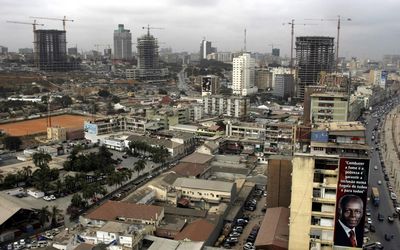Angola faces health crisis after basic services slashed
by Herculano Coroado,
2016-02-15 05:52:53.0
WHEN a plunge in oil prices prompted Angola’s government to slash public spending last year, street trader Antonio Simao Baptista had no idea it would leave his rundown suburb overwhelmed by filth and disease.
The budget of Africa’s second-largest oil exporter has been cut again this year and is 40% lower than two years ago.
Services, including rubbish collection and water sanitation are overlooked by contractors who aren’t being paid or can’t import equipment, contributing to a surge in deadly diseases.
"Look at the garbage, and also the water we drink is filthy. The water in my home is brown. I was raised in the colonial era and I have never seen this before," says Baptista swatting away flies and mosquitoes swarming overhead.
An outbreak of yellow fever has killed 37 people since December while there has been an increase in reported cases of malaria, cholera and chronic diarrhoea, health officials say.
The yellow fever outbreak began in Luanda’s vast Viana suburb of 1.6-million people, but has spread to other parts of the country.
In Viana and other poor Luanda suburbs, piles of uncollected waste block traffic and some residents have resorted to setting fire to mounds of rubbish.
The situation has worsened since the rainy season began in December, as storms wash discarded waste and contaminated water into supplies used for washing and drinking. At Luanda’s Cajueiro Hospital this week, crowds of people waiting for treatment for cholera, diarrhoea and suspected yellow fever were packed into small rooms.
"You see? One more person dead now," says Maria Baptista pointing at a sobbing woman who was just informed about the death of a family member.
Baptista, no relation of Antonio, was queuing outside the hospital with dozens of other people trying to get into the packed clinic.
The annual budget for rubbish collection in Luanda was slashed this year to $10m from $30m.
"Most of the problems are caused by mosquito bites resulting from tons of waste all over the town," says Vlademiro Russo, a top environmentalist who advises the Angolan government. "It is very important we find a solution fast."
Angola relies on crude exports for about 95% of its foreign exchange earnings and a 70% decline in oil prices since mid-2014 has sent the kwanza plummeting.
When the budget for waste removal was cut in August last year, the central government placed the management of sanitation under local municipal offices, but funding was limited and many outstanding contracts had not been paid.
Central government has held emergency meetings this week and could deploy security forces to help tackle the crisis. "We will redefine the ways of combating the disease. The security forces should be supporting the health agencies throughout the country," says ministry of interior spokesman Simão Milagres.
The unsanitary conditions many poorer Angolans have to endure is not the reality in other areas of Luanda, which is one of the world’s most expensive cities for foreigners, and home to billionaire oil magnates and politicians.
Many Angolans are unhappy about the government’s failure to bridge the inequality gap.
"We provided support to this government but we see everything is derailing. The rich drink nice clean water, while the poor are left to die," says street trader Baptista.
Reuters

The Angolan capital, Luanda. Picture: SUNDAY TIMES
WHEN a plunge in oil prices prompted Angola’s government to slash public spending last year, street trader Antonio Simao Baptista had no idea it would leave his rundown suburb overwhelmed by filth and disease.
The budget of Africa’s second-largest oil exporter has been cut again this year and is 40% lower than two years ago.
Services, including rubbish collection and water sanitation are overlooked by contractors who aren’t being paid or can’t import equipment, contributing to a surge in deadly diseases.
"Look at the garbage, and also the water we drink is filthy. The water in my home is brown. I was raised in the colonial era and I have never seen this before," says Baptista swatting away flies and mosquitoes swarming overhead.
An outbreak of yellow fever has killed 37 people since December while there has been an increase in reported cases of malaria, cholera and chronic diarrhoea, health officials say.
The yellow fever outbreak began in Luanda’s vast Viana suburb of 1.6-million people, but has spread to other parts of the country.
In Viana and other poor Luanda suburbs, piles of uncollected waste block traffic and some residents have resorted to setting fire to mounds of rubbish.
The situation has worsened since the rainy season began in December, as storms wash discarded waste and contaminated water into supplies used for washing and drinking. At Luanda’s Cajueiro Hospital this week, crowds of people waiting for treatment for cholera, diarrhoea and suspected yellow fever were packed into small rooms.
"You see? One more person dead now," says Maria Baptista pointing at a sobbing woman who was just informed about the death of a family member.
Baptista, no relation of Antonio, was queuing outside the hospital with dozens of other people trying to get into the packed clinic.
The annual budget for rubbish collection in Luanda was slashed this year to $10m from $30m.
"Most of the problems are caused by mosquito bites resulting from tons of waste all over the town," says Vlademiro Russo, a top environmentalist who advises the Angolan government. "It is very important we find a solution fast."
Angola relies on crude exports for about 95% of its foreign exchange earnings and a 70% decline in oil prices since mid-2014 has sent the kwanza plummeting.
When the budget for waste removal was cut in August last year, the central government placed the management of sanitation under local municipal offices, but funding was limited and many outstanding contracts had not been paid.
Central government has held emergency meetings this week and could deploy security forces to help tackle the crisis. "We will redefine the ways of combating the disease. The security forces should be supporting the health agencies throughout the country," says ministry of interior spokesman Simão Milagres.
The unsanitary conditions many poorer Angolans have to endure is not the reality in other areas of Luanda, which is one of the world’s most expensive cities for foreigners, and home to billionaire oil magnates and politicians.
Many Angolans are unhappy about the government’s failure to bridge the inequality gap.
"We provided support to this government but we see everything is derailing. The rich drink nice clean water, while the poor are left to die," says street trader Baptista.
Reuters

















Change: -0.36%
Change: -0.29%
Change: 1.81%
Change: -0.81%
Change: -1.12%
Data supplied by Profile Data
Change: -0.97%
Change: -0.08%
Change: -0.36%
Change: 0.00%
Change: -0.22%
Data supplied by Profile Data
Change: -0.39%
Change: -0.11%
Change: -0.49%
Change: 0.15%
Change: -0.88%
Data supplied by Profile Data
Change: 1.44%
Change: 0.11%
Change: 0.92%
Change: -1.96%
Change: -0.29%
Data supplied by Profile Data